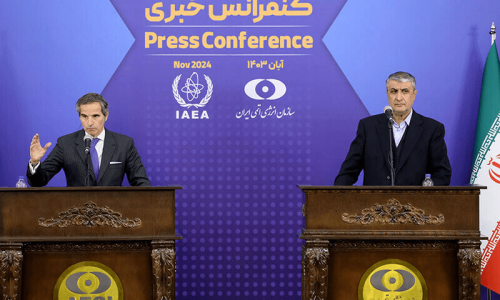KARACHI: Is the presence of the blasphemy law beneficial to our country and Islam? Why has sectarianism increased in our society? Is the state a Punjabi state? And what elements are the shapers of our intolerant attitude? These critical questions were put forth and answered by speakers at the “Conference on tolerance in a multicultural society” organised by the Faculty of Arts, University of Karachi, on Friday.
Discussing at length ‘the shapers of our intolerant attitude’, Dr Mohammad Waseem, political science professor at LUMS, said: “During the late 40s and until 60s it was the state that was defining religion. This we can see in Mr Jinnah’s 1947 speech and the constitutional debates at the time. There were minority religious elements that wanted Sharia to be implemented but they did not have political influence in the new state. In recent decades, it is religion that is defining the state. The earlier minority religious elements have expanded.” This expansion was indicated by the shifting of Pakistan’s Central Asian-Iranian brand of Islam to the Arabist doctrine, he added.
Deeply critical of the shift, Dr Waseem said that it was disturbing to see the state pursuing a divinely ordained agenda.
He gave examples of the religious wars in the sixteenth century in Europe to illustrate his point and said: “Nations have interests and not ideologies because they can never reach a consensus on the basis of religious ideology.”
Conspiratorial mindset
The conspiratorial mindset was also what had deeply influenced the intolerant behaviour in society, pointed out Dr Waseem. “We are extremely rooted in conspiracy theories. We have a siege mentality. We see ghosts lurking in every corner. We assume that Hindus, Jews and Americans are out to kill us.” According to the political science professor, this way of thinking de-legitimises the minorities with the majority paying a less price for being intolerant. “There is no social sanction against this kind of behaviour. There is social acquiescence of violence in our society.” He cited Malala Yousufzai as a classic case of the conspiratorial mindset in which many were and are still convinced that she is part of some “nefarious American agenda”.
Prerequisites for a tolerant society
In an attempt to gauge students’ understanding of intolerance in his talk, Babar Ayaz, author of What’s Wrong with Pakistan, asked the following questions: “Do you think sectarianism has increased and if so why? Have ethnic issues contributed to the intolerant attitudes? Is the blasphemy law beneficial to Islam and Pakistan? And if a murder is committed, is it a personal matter?”
It was heartening to hear answers of the students who condemned the factors stated in Mr Ayaz’s queries that had escalated intolerant behaviour. He then went on to list the prerequisites for a tolerant and peaceful society. “Only a Pakistan, where democracy is allowed to evolve its value system, promises a more tolerant society. Only a secular Pakistan, where all residing in it feel equal and have control over economic resources, can ensure peaceful coexistence of all religious communities and sects. Only a Pakistan, where the armed forces are under the democratic government, would lead to the strengthening of democracy.” He further elaborated on the last point by linking it to Pakistan Tehreek-i-Insaf chief Imran Khan’s ‘Azadi March’ saying that this would weaken Prime Minister Nawaz Sharif but so will Imran Khan.
Pakistan, a Punjabi state?
The final speaker of the conference, Dr Farhan Hanif, assistant professor of international relations, Karachi University, read an insightful paper on ethno-political tolerance in Pakistan. Raising the question whether the Pakistani state was really a ‘Punjabi state’, his answer was both yes and no. “I said yes because the bureaucracy and the military have long been dominated by the Punjabis and continue to do so. There are reports that efforts are being made to recruit men to army from Sindh and Balochistan, however the officers’ cadre in the armed forces is predominantly Punjabi.”
But then Dr Hanif felt that in some ways the state was not a Punjabi state. “If one looks at the current political crisis, then the Punjabi-dominated establishment is in conflict with the Punjabi-dominated government.” Another reason he observed that the state was not a Punjabi one was to look at constitutional privileges. “The constitution states that the head of the state has to be a Muslim, but it does not say that he/she has to be a Punjabi. On the other hand, the constitution of countries such as Malaysia, Israel, Turkey and Sri Lanka states that a particular core nation group will lead the nation.”
Published in Dawn, August 23rd, 2014












































